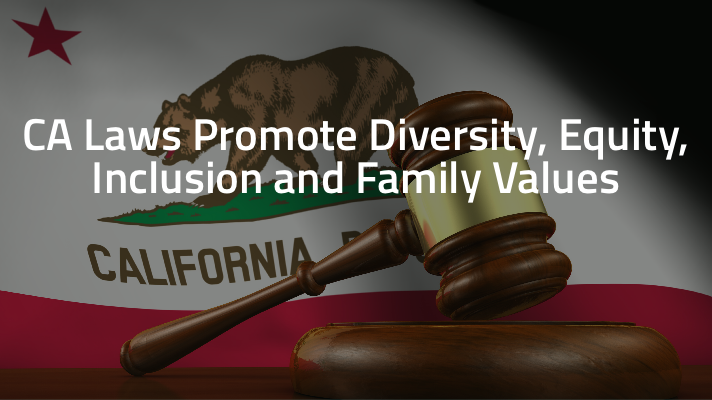Written By Christopher B. Dolan and Kim E. Levy
This week’s question comes from Linda R. from Oakland: I’ve been hearing a lot about new laws that have been passed in the last several months in California. Can you tell me about laws that could benefit families with children?
Thank you for asking, Linda. There has been a wave of new legislation passed in California this year geared towards helping families and rounding out public education. Here are some of the highlights promoting diversity, equity, inclusion, and family values in California.
California Comeback Plan
Governor Newsom’s California Comeback Plan makes enormous investments into early childhood education by providing universal transitional kindergarten education by 2025 with implementation in some school districts as early as Fall 2022. Specifically, the program provides free, high-quality, pre-kindergarten for all four-year-old children in California. The plan also increases the amount of supervision provided to children by reducing class sizes and cutting adult-to-child ratios in half with at least an average of 1 adult for every 12 children, down from 1 for every 24 children. The plan also provides $1,500 to 3.7 million low-income students as seed money for college savings accounts.
Expanded Family Leave
On September 27, 2021, AB1033, a bill expanding the California Family Rights Act was signed into law. Under this law, employers must provide eligible employees up to 12 weeks of job-protected leave from work, on an annual basis, to care for a parent-in-law with a serious medical condition. This law will provide new protections and greater flexibility for employees that must care for their aging in-laws, and is clearly beneficial to families struggling finding adequate care for a family member and/or struggling financially with affording outside care for a family member.
Parent Healthcare Act
Since the passage of the Affordable Care Act under President Obama allowing children to remain on their parents’ insurance plans up to age 26, it is becoming more common for states to expand that coverage up to age 30 (Florida, Illinois, Pennsylvania, New Jersey). However, California has become the first state to expand coverage to allow adult children to include their dependent parents on their health insurance plans. To be eligible for this coverage, adults must rely on their child for at least 50% of their total support. Unfortunately, the law only applies to people who have purchased their insurance on the individual market. Those who have insurance through work are not eligible to add their parents to their plans. This law is meant to help increase healthcare access to adults living in the country illegally who are ineligible for Medicaid or Covered California plans. This law will take effect in 2023.
Teaching Mental Health
SBB 224 is an important bill requiring middle schools and high schools to incorporate mental health instruction into existing health education curriculum. Instructional content will include habits that promote mental wellness, hope to spot signs and symptoms of common mental health conditions, and how to seek help for mental health related conditions. The purpose of this bill is to help reduce stigma and start conversations around mental health in schools.
Ethnic Studies as High School Graduation Requirement
AB101, which goes into effect by the 2024-25 school year, will require that all California public high school students receive education in ethnic studies in order to graduate. Under this law, school districts may either develop their own lesson plans or use a model curriculum created by the state board of education. The importance and benefit of this law is self-evident and supported by significant research which has found that students perform better in school if they see themselves in the lesson being taught. In signing this bill into law, Governor Newsom said, “Ethnic studies courses enable students to learn their own stories, and those of their classmates, and a number of studies have shown that these courses boost student achievement over the long run – especially among students of color. I appreciate that the legislation provides a number of guardrails to ensure that courses will be free from bias or bigotry and appropriate for all students.”
Gender Neutral Toys
Last but not least, AB1084 mandates large department stores selling children’s products to provide a gender-neutral toy and childcare item section within the store. Stores that do not comply with the law will face fines of up to $500. While this bill will not radically alter the shopping experience, it represents a small step in a push toward greater change and inclusion.









